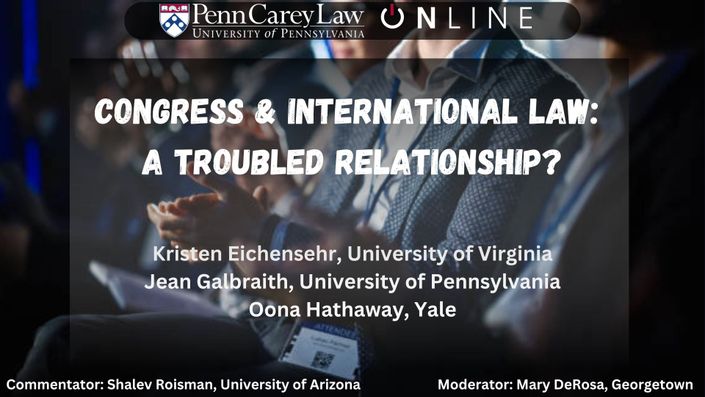
Congress and International Law: A Troubled Relationship?
1.5 Substantive credits
The University of Pennsylvania Law Review
Congress and International Law: A Troubled Relationship?
Despite the perennial debates about the scope of the President’s constitutional authority, we have today a largely statutory president, even in foreign affairs. Most important actions that presidents take have some connection to a statute. This means that the law governing statutory authorization and delegation—a mix of constitutional law, interpretive principles, and administrative doctrine—has become central to questions of executive power. President Biden’s various forms of support for Ukraine and sharp restrictions on economic interaction with China are ultimately connected to statutes. Many of President Trump’s controversial actions, including the travel ban and the emergency border wall funding, were justified as delegations from Congress. For over two decades, the “war on terror” has been fought primarily based on a 2001 statute and series of congressional appropriations. The vast majority of binding international agreements made by the executive branch purport to be authorized by Congress. There are many more examples.
To understand the modern foreign affairs presidency, one must know how to assess and interpret the statutory bases for presidential action. Yet, there is an enormous array of unresolved questions about the right way to approach these issues, even as they grow increasingly important.
In recent years, the Supreme Court has become more focused on issues of delegation and authorization and has raised new questions about how these issues should be resolved in the foreign relations law context. Some justices have supported a revival of a stricter nondelegation doctrine. But the same justices in the vanguard on this issue have indicated that foreign affairs delegations should be treated more generously. Some commentators, however, have started to question that exceptionalism for foreign affairs delegations on both historical and theoretical grounds.
In the meantime, the Supreme Court has been applying a “major questions doctrine,” and there is uncertainty about how that doctrine applies in the foreign affairs context. This question is further complicated by past decisions in which the Supreme Court has suggested that statutory delegations of foreign affairs authority should be construed more generously than delegations of domestic authority, in light of Congress’s awareness of the executive branch’s functional advantages in the foreign affairs arena.
This course brings together leading scholars to promote scholarship addressing the many unresolved and unaddressed questions of statutory delegations of foreign affairs powers.
The Law Review is proud to partner with Curtis Bradley (University of Chicago) and Jack Goldsmith (Harvard).
Moderator: Mary DeRosa, Georgetown
Paper Presenters:
- Kristen Eichensehr, Virginia
- Jean Galbraith, University of Pennsylvania
- Oona Hathaway, Yale
Commentators: Shalev Roisman, Arizona
Your Instructor

